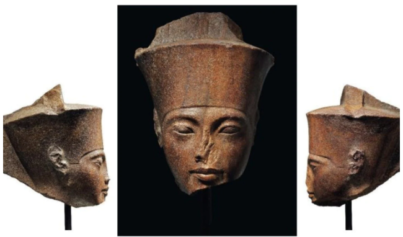Update – Hosni Mubarak Dead – Egypt’s ex-president Hosni Mubarak was declared clinically dead after he was transferred to hospital from prison, state media reported, after his heart stopped beating.
CAIRO —Former President Hosni Mubarak uses a wheelchair, is able to eat little more than Jell-O, and has his two grown sons by his bedside. He suffers from sore joints in his feet, high blood pressure, shortness of breath and, according to rumors widely circulated in the Egyptian and foreign press, he required artificial respiration and heart defibrillation within the space of just 24 hours last weekend. Twice, doctors could not find his pulse, the reports said.
Such public speculation about Mr. Mubarak’s health was a crime during his 30 years in power. But since he received a life sentence on June 2, a torrent of leaks has sprung suggesting that he may be nearing his end. The revolt that ousted him is nearing a climax with a presidential election on Saturday pitting an Islamist group he outlawed against his last prime minister, Ahmed Shafik.
And in the same way news of his deteriorating health was once withheld to protect his image — Egyptians chided his self-regard as pharaoh-like — many people here assume the military-led government is doling out sympathetic details in order to manipulate public opinion. The ruling generals, many assert, are laying the groundwork for Mr. Mubarak to be transferred from a prison hospital to the relative comfort of a military hospital, or perhaps trying to build sympathy for the longtime autocrat to diminish opposition to his former prime minister, Mr. Shafik.
The rumors of his deteriorating health — some denied by government officials — are the latest measure of Egypt’s unsettled state, haunted by divisions and doubts, old specters and fresh paranoia.
“Mubarak dies three times a day,” said Ashraf al-Baz, a 42-year-old computer engineer on a hunger strike for eight days to protest the government refusal so far to enforce a law that would bar Mr. Shafik’s candidacy because of his ties to Mr. Mubarak. “It doesn’t affect us. We don’t believe anything any longer. They think if people think he’s on the brink of death, this will calm people down.”
Mr. Baz said that while newspapers obsessed about Mr. Mubarak’s every turn, few people had paid attention to the demands of dozens of hunger strikers. “Everyone knows he is going to be released,” he said.
Mr. Mubarak, a former fighter pilot, is 84, and during the decades when it seemed only death could end his rule rumors about his health swirled constantly despite the official prohibitions. As recently as 2008, the Mubarak government sentenced a newspaper editor, Ibrahim Eissa, to prison for writing articles raising questions about the president’s health, including one titled “Gods Don’t Get Sick.” Mr. Mubarak pardoned him, but his jail sentence nonetheless deterred further speculation.
Two years ago, the government acknowledged that he had traveled to Germany for surgery to remove his gallbladder and a tumor that was said to be benign.
In interviews, Egyptian officials this week said that teams of doctors assembled by the prison authorities and public prosecutors had both recommended that Mr. Mubarak be moved from prison care to a hospital and that the third floor of an upscale military hospital had been prepared for him.
But his transfer is likely to ignite more protests with the presidential vote scheduled to take place within days, so officials from the Interior Ministry said that for now, prison officials were resisting the move, despite the doctors’ recommendation, to avoid inflaming public sentiment.
“That might actually be correct,” said Samer Shehata, an Egyptian-American political scientist at Georgetown University who confessed to a “voyeuristic” fascination with the various reports of Mr. Mubarak’s condition.
During his first days in prison, Mr. Mubarak “cried” during a prison visit with his wife and daughters-in-law, state media reported. On Monday, another report described the former president’s sons and nurses pushing him around the prison grounds in a wheelchair “in an attempt to treat the shortness of breath he suffers from.” The prison intensive care unit, the Web site of the state newspaper Al Ahram said, lacked good ventilation. Its air-conditioning was switched off because it bothered Mr. Mubarak.
Mr. Mubarak’s condition had improved a little, the state newspaper reported Monday, so that he could now eat “light meals with no calories.” But his condition was still deemed unstable because of the atrial fibrillation, “the risk of high blood pressure and the possibility of having a stroke.”
The report added that he suffered from “limpness in all the body’s muscles” and doctors worried about muscle atrophy.
“Frankly speaking, I don’t know the reality,” said Emad Gad, a leader of the Social Democratic Party who said many Egyptians would be sympathetic to the idea of transferring Mr. Mubarak. The reports could cut two ways for Mr. Shafik, who might benefit from sympathy for his former boss but might also come under criticism if they lead to Mr. Mubarak’s eventual release on medical grounds.
Mr. Shafik’s opponent, Mohamed Morsi of the Muslim Brotherhood, is already seeking to make retribution against Mr. Mubarak a central issue of the presidential race. If Mr. Mubarak is moved to a hospital, Mr. Gad said, the Brotherhood will be likely to charge that the generals ordered it and that Mr. Shafik, if he were elected president, would release him.
When Mr. Mubarak was in power, the strictly enforced silence about his health was a hallmark of his stifling autocracy.
“The president only has to say he is well and we should thank God and shut up, not a single word after that,” the Egyptian novelist and critic Alaa Al Aswany wrote in a 2010 essay that contrasted the silence of the Egyptian media with the obsessiveness of American news organizations when it came to presidential health.
“In despotic regimes, the head of state is not portrayed as an ordinary human but as an inspired and unique leader of unequaled wisdom and courage, in fact as a legend rarely matched in the history of the nation,” Mr. Aswany wrote. He noted that Egyptian state media had reported that presidential aides sometimes had trouble keeping up with their octogenarian leader “because of his extraordinary dynamism and vigor.”
Now that Mr. Mubarak is no longer president for life, however, some Egyptians say they find the flood of details much less interesting than the old illicit rumors.
“Before, no one talked about it,” said Hussein Mahmoud, a 34-year-old hotel security worker. “Now, it’s the subject of continuous speculation.” The aim, he said, was “to win sympathy” for the former president, but the effort — whoever was behind it — was wasted.
Next to the acquittals in the related criminal cases against Mr. Mubarak’s sons and top security officials, Mr. Mahmoud said, “This doesn’t make a difference.”
“May God help everyone who is sick,” said Mohsin Ahmed, a government worker. “The Egyptian people are a sympathetic people.
“But why should he be transferred?” Mr. Ahmed said. “His place is in prison.”
Source: NY Times


